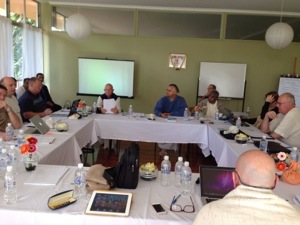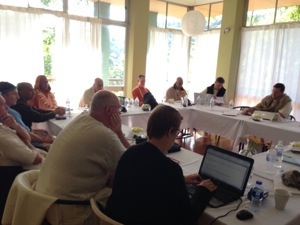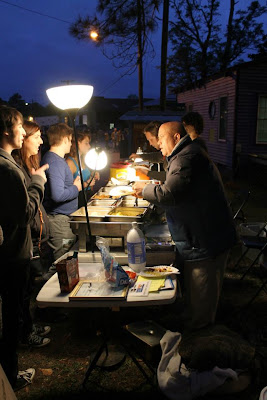Diary of a Traveling Sadhaka, Vol. 9, No. 7
By Krishna-kripa das
(April 2013, part one)
North Florida
(Sent from Dublin, Ireland, on May 17, 2013)
Where I Went and What I Did
The beginning of April was special for me with the visit of my friend Trevor, with whom I did harinamalast year in England, Scotland, Germany, and Poland, and kirtana programs in Czech Republic and Slovakia, as well as traveled to the Ukraine festival and to Warsaw for Radhastami. He came with me to Tampa, Tallahassee, and Jacksonville, and really excelled at talking to the students, inviting them to programs, and interesting them in books about spiritual life. Eight devotees from Krishna House came to First Friday and a harinama at Springtime Tallahassee, and we had a great time sharing the holy name and spiritual books with others. New Raman Reti had their first holi festival (festival of colors), and it was very successful. I left Krishna House mid-month to go to New York City and ultimately to Europe, and I reflect on my experience at Krishna House this time.
In the matter of insights I share notes from my daily reading of Srila Prabhupada’s books, a beautiful prayer to Srila Prabhupada by Satsvarupa Dasa Goswami, and notes from our classes in Krishna House on the Tenth Canto of the Bhagavatam, as we end the semester.
Thanks to Andrea Perez Del Solar, Tulasirani Devi Dasi, Krsodari Devi Dasi, Trevor Manton, Facebook User "Photo Is My Life," and whoever else I may have missed, for all the photos illustrating this issue
Tampa
Trevor came with me to Tampa this time, and we chanted and had a book table at the market day at the University of South Florida for five hours. Trevor, who is just a few years out of college, could easily relate to the students and speak to them about the limitations of the Western education he had experienced and encourage them to investigate Krishna consciousness. In Europe we had just chanted to together on the streets, but in Tampa I found he was very good at speaking to students and distributing books—five Bhagavad-gitas and about twenty small books for eighty dollars. Two people he spoke to came to our evening program behind the library, and one brought a friend. One Hispanic girl was very interested, and he talked to her for a while after the program. Also someone I talked to two weeks before came to the program for the first time. Thus in many ways our visit to Tampa was very successful, and Trevor was inspired by it.
Tallahassee First Friday and Harinamas
Enough of the Krishna House students were enthusiastic enough about First Friday in March that we returned to Tallahassee for the First Friday in April. In addition, we stayed over night and did a harinama with some local devotees and devotees from Alachua at the street fair after the Springtime Tallahassee parade, a parade that we did not participate in this year.
At First Friday Daru Brahma Prabhu and his helpers distributed lots of Krishna food.
Our party sang . . .
. . . and distributed books.

In particular, Tulasirani Devi Dasi was very enthusiastic about book distribution.
I gave out invitations and talked to people who were looking at our kirtana party.
Hladini, a seventeen-year-old child of devotee parents, had some nice realizations. She was not feeling very well at all, but she distributed books anyway and transcended the pain. At one point, I noticed she got some people to sit down on the blanket and chant with us, and I later asked her how. She explained that she gave them a book but they had no donation and asked if there was anything they could do for her. She replied that they could sit down on the blanket and chant Hare Krishna with us, and so they did. Thus she distributed both a book and the holy name at once to those fortunate souls.
I missed over half of our Saturday harinama because one person forgot his drum, another forgot the invitations, and another suggested I get water for the party in the course of going back for the drum and finding the invitations. Thus a got sense of what you have to go through if you play the role of a leader of a party, something I rarely do.
The location was great for chanting. Many, many hundreds of people were wandering from one stall to another. Although there were dozens of Florida policeman guarding the event, miraculously none restricted our party of chanters with its amplified sound, and I was grateful about that. We visited a section set aside for children’ events, and several children took pleasure in watching and ultimately dancing with the devotees, generally to the approval of the parents. In fact, one mother we passed exclaimed to her two children, “They are such peaceful people!”
Daru Brahma Prabhu and the Tallahassee devotees served Ekadasi prasadam in a park at the end of the event, and my Krishna House friends returned to Gainesville, and Trevor and I stayed in Tallahassee to chant at Lake Ella on Sunday and the campus of Florida State University Monday, Tuesday, and Wednesday. Trevor helped out by making some really great peanut butter cookies for distribution. He was so enthusiastic about chanting and talking with students and doing a book table, that on a couple days, he stayed out for two extra hours, past the three hours I generally do.
I had one nice experience myself there on the campus. One student had taken a small book the previous day and said she liked it. I asked which part she liked best. She described it, and I found the place in the book, and it was a part I also liked and I told her so. It is an excerpt from the Preface to The Nectar of Devotion, where Srila Prabhupada speaks about love:
“The basic principle of the living condition is that we have a general propensity to love someone. No one can live without loving someone else. This propensity is present in every living being. Even an animal like a tiger has this loving propensity at least in a dormant stage, and it is certainly present in the human beings. The missing point, however, is where to repose our love so that everyone can become happy. At the present moment the human society teaches one to love his country or family or his personal self, but there is no information where to repose the loving propensity so that everyone can become happy. That missing point is Krishna and The Nectar of Devotionteaches us how to stimulate our original love for Krishnaand how to be situated in that position where we can enjoy our blissful life.
“In the primary stage a child loves his parents, then his brothers and sisters, and as he daily grows up he begins to love his family, society, community, country, nation, or even the whole human society. But the loving propensity is not satisfied even by loving all human society; that loving propensity remains imperfectly fulfilled until we know who is the supreme beloved. Our love can be fully satisfied only when it is reposed in Krishna.”
Later another student was looking at the books, and I showed her that book and pointed to the same section of the book that the other girl had liked, and asked her to read it. She was attracted by Prabhupada’s description and took the book. I asked her for a donation, which I do not really like doing, but which Trevor was accustomed to doing, so I did it anyway, and she gave twenty dollars for a small book that people usually give a dollar for.
Trevor spent thirteen hours over the three days on the FSU campus, and he would invite people to our Tuesday Bhagavad-gita class and a special three-hour kirtana on Wednesday. As at Tampa, many students said they would come, but unlike Tampa, none of them did. I wondered why, and upon reflection, decided that because the Tampa program was on the campus itself, just behind the library, it was at a nearby and familiar place. Although our center in Tallahassee is just two and a half blocks from the campus, it was unknown and just a little inconvenient, and so none was willing to take the risk to come there. At Krishna House, I think we can learn a lesson from this. To reach more students we have to do some programs on the campus itself. Even though Krishna House is just three blocks from the University of Florida campus, we probably lose a few people by the little bit of distance and unfamiliarity.
We went to Garuda Prabhu’s yoga studio. Turns out that night he was just painting instead of doing his yoga program, but he engaged us in telling the story of Nrisimhadeva to his students while they painted, and Trevor had interesting conversations with students, encouraging one to get a Bhagavad-gita, as well as distributing more peanut butter cookies. I found a couple people interested in Daru’s cooking classes.
Thursday we went to Jacksonville where we chanted at the University of North Florida. We did not have the variety of books or a book table, so it was not as conducive for Trevor’s style of preaching. Still some students chanted with us briefly, and I got to introduce Amrita Keli Devi Dasi, who is organizing our outreach there, to a math professor friend who loves Krishna food from her graduate days at University of California at San Diego, where Bhakta Kevin would regularly distribute prasadam.
There was a lot of dancing at our UNF Krishna Club program this time, and some of students were really enchanted by it. Tulasirani and Alex, who came from Krishna House for the program, took Trevor and I back to Gainesville, thus ending our harinama excursion to Tallahassee and Jacksonville.
Holi (Festival of Colors) in North Florida
Holi, or the Festival of Colors, is becoming more popular within ISKCON and within human society. This year I heard of holi festivals at University of Florida in Gainesville and University of North Florida in Jacksonville, in addition to the first ever holi festival in Alachua.
In ISKCON, Caru Prabhu who has a temple in Utah, has a holi festival which attracts thousands of people to his temple there, many of the them local Mormons. In fact, one Mormon music major became so enchanted by Hare Krishna kirtana from that festival, she went on do her Ph.D. dissertation on Kirtana at Hare Krishna Festivals, and is planning to write a book on kirtana using the extra material she collected.
The Krishna House devotees catered a spaghetti lunch for the Indian students’ holi festival at University of Florida. And we chanted there as well.
Later we moved up to the stage and thirty or forty people danced with us for a while. I missed that part because I was talking to a student who became attracted to our initial chanting and wanted to know more.
At ISKCON Alachua, the holi festivalwas celebrated for the first time. Three devotee bands played on a stage near where the colors were thrown, Srikalogy, The Mayapuris, and TK and the Namrock Band. Many, many people participated, and the prasadam for lunch was wonderful. Devotees who work at Krishna Lunch noticed that many university students came and enjoyed the fun, and got more Krishna music, food, and association than usual, a cause for happiness. Both initiated devotees and students came from Tampa, Tallahassee, and Jacksonville for the event.
I wore a dhoti and kurta with holes that I was planning to throw out in case the dye did not come out.
Trevor, having recently traveled from India, had no old clothes and was worried about what to wear. He found a purple sari in the free clothes bin and ripped it in half to make a top and bottom piece. People who did not know him or the story behind his outfit wondered about his appearance, perhaps thinking he always dressed in such an eccentric fashion, but I just thought it was a little humorous.
With all the harinamas, the chanting in the temple, the outreach programs, and the classes, I felt I got to know and love the devotees at Krishna House more than usual during the three or four months I spent there. It was awesome for me to see a lot of young people with wonderful devotional qualities like such as appreciation of kirtana, appreciation of spiritually advanced personalities, enthusiasm to serve others, delight in cooking for Krishna and his devotees, and enthusiasm to share Krishna with others. I hope they are able to maintain and expand these assets throughout their glorious lives of service to Krishna and humanity. The leaders of the project were also exemplary in steadiness and concern for others, and truly inspirational. I felt happy to be involved with the project, and I look forward to returning in October for another three months. We are indebted to Kalakantha Prabhu for heading up the project, and devotees, like Hanan and Ballaba and Caitanya, who are very dedicated, spending years with it. Tulasirani devi dasi did a good job arranging classes and special events this year. Especially memorable was Gasparilla harinama,the 12-hour kirtana, and the First Fridays harinama in Tallahassee, and also the Ocala Rainbow Gathering harinama, which Caitanya organized.
When I leave each year, I know some of the people I will never see again, and thus I feel a little sad. It calls to mind a quote I read in Krishna book, Chapter 82, just last night where Krishna consoles his gopi friends, “Our separation was ordained by Providence, who after all is the supreme controller and does as He desires. He causes the intermingling of different persons, and again disperses them as He desires. Sometimes we see that due to the presence of clouds and strong wind, atomic particles of dust and broken pieces of cotton are intermingled together, and after the strong wind subsides, all the particles of dust and cotton are again separated, scattered in different places. Similarly, the Supreme Lord is the creator of everything. The objects which we see are different manifestations of His energy. By His supreme will we are sometimes united and sometimes separated. We can therefore conclude that ultimately we are absolutely dependent on His will.”.
I want to thank Srikar Prabhu of Gainesville, who in addition to inviting me to a delicious lunch of doshas and coconut chutney, kindly bought me a camera so I can provide more illustrations in future editions of this journal.
Insights
Srila Prabhupada:
from Sri Caitanya-caritamrita,Adi 16.8, purport:
“Although Lord Sri Caitanya Mahaprabhu and His devotees in disciplic succession can defeat all kinds of learned scholars, scientists and philosophers in arguments, thus establishing the supremacy of the Personality of Godhead, their main business as preachers is to introduce sankirtanaeverywhere. Simply to defeat scholars and philosophers is not the occupation of a preacher. Preachers must simultaneously introduce the sankirtana movement, for that is the mission of the Caitanya cult.”
from Sri Caitanya-caritamrita, Adi Chapter 17 summary:
“The attitude of Srimati Radharani is considered the superexcellent devotional mentality.”
from Sri Caitanya-caritamrita, Adi 17.1:
“Let me offer my respectful obeisances to Sri Caitanya Mahaprabhu, by whose mercy even unclean yavanasbecome perfectly well bred gentlemen by chanting the holy name of the Lord. Such is the power of Lord Sri Caitanya Mahaprabhu.”
from Sri Caitanya-caritamrita, Adi 17.1, purport:
“Even in the United States, when our devotees chant on the street, American ladies and gentlemen inquire from them whether they are actually Americans because no one could expect Americans to become such nice devotees all of a sudden. Even Christian priests are greatly surprised that all these boys from Jewish and Christian families have joined this Krishna consciousness movement; before joining, they never regarded any principles of religion seriously, but now they have become sincere devotees of the Lord. Everywhere people express this astonishment, and we take great pride in the transcendental behavior of our students. Such wonders are possible, however, only by the mercy of Sri Caitanya Mahaprabhu. They are not ordinary or mundane.”
from The Nectar of Devotion, Chapter 42:
“That is the way of rendering transcendental loving service to the Lord; when devotees are put into great difficulties—even like the Pandavas, as described above—they feel all their miserable conditions to be great facilities for serving the Lord.”
from Sri Caitanya-caritamrita, Adi 17.28, purport:
“This practice of forbearance (taror iva sahisnuna) is very difficult, but when one actually engages in chanting the Hare Krishna mantra, the quality of forbearance automatically develops. A person advanced in spiritual consciousness through the chanting of the Hare Krishna mantra need not practice to develop it separately, for a devotee develops all good qualities simply by chanting the Hare Krishna mantra regularly.”
from Sri Caitanya-caritamrita, Adi 17.29:
“Thus a Vaishnava should not ask anything from anyone else. If someone gives him something without being asked, he should accept it, but if nothing comes, a Vaishnava should be satisfied to eat whatever vegetables and fruits are easily available.”
from Srimad-Bhagavatam 4.26.21, purport:
“If one accepts punishment as a reward dealt by the master, he becomes intelligent enough not to commit the same mistake again.”
from The Nectar of Devotion, Chapter 46:
“The activities of a person, even if they are not very extraordinary, create an impression of wonder in the heart and mind of the person’s friends. But even very wonderful activities performed by a person who is not one’s friend will not create any impression. It is because of love that one’s wonderful activities create an impression in the mind.”
Satsvarupa Dasa Goswami:
from Calling Out to Srila Prabhupada:
“O Prabhupada, who dressed always in saffron, who wrote affectionate letters to his disciples signed ‘Your ever well-wisher,’ who wrote to his leaders, ‘Never be a moment without thinking how to improve ISKCON,’ who encouraged each department of workers without discouraging another, who gave all of his life’s energy for spreading Krishna consciousness, who was empowered with success never achieved by previous acaryas,and who opened the door for the entire world to appreciate Gaudiya Vaisnavism as the eternal teachings of topmost love of God, we pray to always retain utmost respect for you and your teachings.”
Kalakantha Prabhu:
Although it appears odd that the devotee Akrura was employed by the demoniac King Kamsa, Akrura’s devotion to Kamsa ended when he left the palace.
Q (by Vaishnava das): Krishna is more famous as son of Yasoda than the son of Devaki, but he spent ten times more time outside of Vrindavana. Why?
A: Yasoda has a higher rasaof spontaneous love. Also it is considered that the feeling love separation is actually higher.
Mucukunda did not want the demigods to bother him to fight once again on their behalf thus he asked for the boon of burning to ashes whoever awakened him.
Neophyte devotees go up and down in their spiritual lives. When they associate with their devotional friends they become inspired spiritually, and when they associate with their materialistic friends they neglect their spiritual life.
comment by Bhakta Mike:
Although Krishna took pleasure in fighting Canura, because Canura was not trying to please Him but to kill Him, it is not counted as devotional service.
comment by Arjuna Prabhu:
The pastime of Vidura enlightening Dhrtarastra shows we should not become so attached to our dependents that we forget what is right and what is wrong.
comment by Rupacandra Prabhu:
It is interesting that although Dhrstarastra had the association of Narada, Vidura, and so many pure devotees, still he was not able to assimilate their instructions. That reminds me of the verse by Prahlada Maharaja, matir na krishne paratah svato va, mitho ’bhipadyeta griha-vratanam, adanta-gobhir visatam tamisram, punah punas carvita-carvananam. “Because of their uncontrolled senses, persons too addicted to materialistic life make progress toward hellish conditions and repeatedly chew that which has already been chewed. Their inclinations toward Krishna are never aroused, either by the instructions of others, by their own efforts, or by a combination of both.” (Srimad-Bhagavatam 7.5.30)
comment by Bhakta Paul:
Although some people were mystified, Krishna released Jarasandha after Balarama fought and bound him because He had a deeper plan.
comment by Dorian:
It seems to me Krishna had a sportive childlike mood, “Let’s make a fort and protect our friends. Then we can conquer the enemy.”
It is wonderful to see how the demigods are interacting with Krishna, showering flowers on Him when he is victorious in battle.
comments by students:
Visvanatha Cakravati Thakura describes that the demons get to see Krishna, but they do not see His sweetness. He also mentions that Akrura’s prayers reveal the consciousness a visitor of Vrndavana should have.
It is described that the day Akrura arrived at Vrndavana was Ekadasi and he was fasting, but when Balarama offered him a feast he eagerly accepted it.
The washer man who refused to give Kamsa’s clothes to Krishna and criticized Him instead is the same soul who criticized Rama for accepting Sita after she had lived in Ravana’s kingdom.
comments by Hladini:
When Balarama went to Vrndavana alone, Krishna stayed in Dvaraka because of compassion for its residents. He was worried that if he went to Vrndavana because of His great love for each residents there and they’re love for Him, He would not be able to return to Dvaraka.
Krishna did not abandon the game he was playing when heard of the blazing demon attacking Dvaraka, but merely sent his disc weapon to do the needful.
Dvivida was previously an associate of Lord Rama who made an offense and as a result was condemned to have the bad association of Narakasura and thus became demonic.
comment by Tulasirani dd: It is said Balarama has a complexion the color freshly churned yogurt.
Laksmimani Devi:
If you go to the campus and tell people we follow these four regulative principles and what they are [no illicit sex, no intoxication, no meat eating, and no gambling], the students will not say, “How wonderful! You guys are so free!” Yet Srila Prabhupada called them the regulative principles of freedom.
We do not feel “I cannot eat meat” or “I cannot engage in intoxication.” Thus we can see we have made some advancement.
Sometimes we move forward in our spiritual life, sometimes we move backward, sometimes we stay the same. In time, we advance and become fixed.
We cannot alwaysunderstand a person’s advancement by their external situation.
We know we are not our body, until they serve something for breakfast that we don’t like and then we moan and groan.
When we are building a bridge we have to make sure it goes all the way across the water. We can use the Holi festival to bring people to Krishna, but we have to make sure we do not use it to increase our sense gratification.
Srila Prabhupada had so much faith in the holy name and prasadam. He felt it would purify us, and it did.
Sesa Prabhu:
The best thing in this life is to prepare for our next life.
We do not always understand the great fortune we have in this human form of life.
Khatvanga Maharaja thought although he had but a moment, it would be best used in achieving spiritual perfection.
“Happily ever after” exists in the spiritual world but does not exist in this world.
Rohini Kumara Prabhu:
They say the Hope diamond was from King Yudhisthira’s scepter.
Krishna-kripa das:
I saw a girl on the campus wearing a T-shirt with the slogan, “One life. Many loves.” I was thinking that for us it is “Many lives. One love.” Lord Caitanya prays to Krishna in that way in His Siksastaka,Verse 4, “All I want is your devotional service birth after birth.”
Tulasirani devi dasi:
One jasmine tree at Srivasa Thakura’s house supplied all the flowers the devotees of Lord Caitanya needed for their Deity worship.
After Lord Caitanya came back from Gaya experiencing symptoms of the highest love of Godhead, He glorified Gadadhara Pandita’s lifelong devotion to Krishna while considering He Himself only recently saw Krishna once, but then He disappeared.
In His ecstasy when asked about verbal roots, Lord Caitanya explained elaborately that Krishna is the root of everything.
Lord Caitanya in His ecstasy could not think of anything without its relationship with Krishna. We, however, tend to see maya everywhere [instead of seeing Krishna everywhere].
Dina Bandhu Prabhu:
Because we are all part of Krishna we should be able find some common experience with everyone we meet.
People will be attracted just by prasadam, the maha-mantra and relationships with devotees.
comment by Tulasirani dd: When serving the devotees of the Deity I sometimes experience some satisfaction just acting in the position of serving them, and it is like that the Lord as paramatma is encouraging me to act in my original spiritual situation.
comment by Laura: Just being away from the devotees for two or three days, I find it harder to chant.
Hanan:
There is a story that a young man had a guru who told him to meditate an hour a day. He enthusiastically did that for some time but later life became more complicated, so he told his guru of the difficulty in doing his hour of meditation. The guru listened sympathetically and then advised him to meditate two hours a day.
Yamunacarya was originally born as Yamuna in brahmana family and studied in the gurukula. Once the king’s representative came to fine his guru because he was defeated previously by the king’s digvijaya pandita, Koladhar. Yamuna did not like to hear that his guru had to pay a fine. So he challenged that Koladhar was not actually learned, because his king who he represented was so proud, he must be proud, and pride is a symptom of ignorance. The king was upset about this. Thus it was arranged that Yamuna would debate Koladhar and prove that he was actually ignorant. Yamuna insisted he be personally transported to the capital for the debate, which upset the king even more. The king asked Koladhar to prove false three statements:
My mother is not barren.
The king is most pious and compassionate.
The queen is most chaste.
Koladhar was stumped, and Yamuna solved the riddle.
1. Manu-samhitasays a women with just one child is barren.
2. The king takes on the one-sixth of the sinful reactions of his subjects so how can he be pious?
3. The king is described in the scripture to be identical to seven important personalities and thus the queen was in relationships with seven people at once, and could thus be called unchaste.
Thus Koladhar was defeated, and Yamuna won half the kingdom.
Trevor:
from comments after a class:
I tried chanting “Coca-Cola” for about ten minutes the other day. In the beginning it was alright but after five minutes it got worse, and by ten minutes it was unbearable. Yet in Vrndavana I was chanting Hare Krishna nine hours a day.
-----
anasaktasya visayan
yatharham upayunjatah
nirbandhah krishna-sambandhe
yuktam vairagyam ucyate
“When one is not attached to anything, but at the same time accepts everything in relation to Krishna, one is rightly situated above possessiveness.” (Bhakti-rasamrta-sindhu 2.255)
 This weekend (May 25 - 26), the Hare Krishna Centre is participating In Doors Open Toronto. Annually, 150 buildings of architectural, historic, cultural and social significance open their doors to the public for a city-wide celebration. While Toronto's Hare Krishna Temple is open, free of charge, to the public year-round, Doors Open presents an opportunity for the public to learn about the architectural and historical story of our amazing building!
This weekend (May 25 - 26), the Hare Krishna Centre is participating In Doors Open Toronto. Annually, 150 buildings of architectural, historic, cultural and social significance open their doors to the public for a city-wide celebration. While Toronto's Hare Krishna Temple is open, free of charge, to the public year-round, Doors Open presents an opportunity for the public to learn about the architectural and historical story of our amazing building!





































